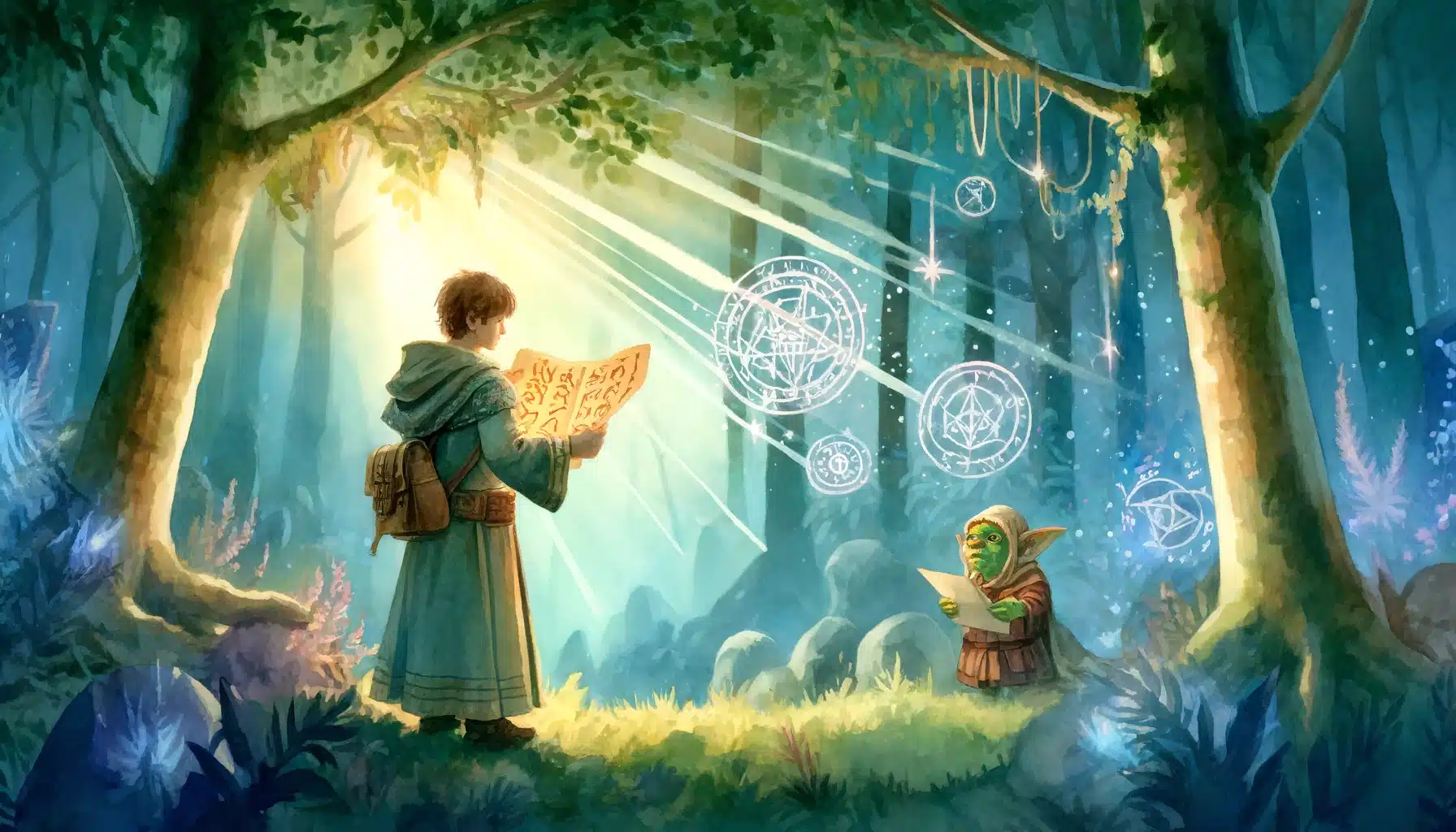Using Comprehend Languages to Unravel Ancient Mysteries in DND 5e
Language barriers can serve as powerful storytelling devices in Dungeons & Dragons (DND) campaigns, adding layers of mystery, intrigue, and complexity to the narrative. By incorporating ancient languages into your campaign, you can create a rich tapestry of history and culture that players must navigate to uncover hidden truths and advance their quests.
Importance of Ancient Languages in World-Building
Ancient languages can play a crucial role in world-building, offering insights into the history, culture, and beliefs of long-lost civilizations. These languages can be used to inscribe ancient prophecies, religious texts, or historical records that provide valuable context for the current events in your campaign. By creating unique languages with distinct scripts and phonetics, Dungeon Masters (DMs) can make the game world feel more immersive and authentic.
Linking to Comprehend Languages
When players encounter these ancient languages, they often need tools to decipher them. One invaluable tool for overcoming language barriers is the Comprehend Language 5e spell. This spell allows players to understand any written or spoken language, making it a crucial asset in unraveling ancient mysteries and progressing through the campaign.
Overcoming Language Barriers
The Comprehend Languages spell is essential for overcoming language barriers. It provides players with the ability to understand ancient texts and communicate with beings who speak forgotten languages. This spell can turn potentially frustrating encounters into engaging puzzles and narrative opportunities.
Understanding the practical use of Comprehend Languages is crucial for players. It allows them to bypass significant obstacles and access hidden knowledge that would otherwise remain locked away. This can include deciphering ancient runes on a temple wall, translating a map leading to a hidden treasure, or understanding a warning inscribed on a dungeon’s entrance.
Integrating Comprehend Languages into Gameplay
Dungeon Masters can integrate the use of the Comprehend Languages spell into key moments of the campaign. For example, players might need to use the spell to decode a prophecy that guides their next steps or to negotiate with an ancient being that holds crucial information.
Try my AI Tabletop RPG generators...and an extensive library of content!
By planning scenarios where this spell becomes indispensable, DMs can highlight its importance and ensure that its use feels meaningful and rewarding. This could involve discovering a series of letters in an ancient dialect that reveal the history of a long-forgotten war, or interpreting the cryptic messages left by a secretive cult.
Strategic Use of the Spell
Encouraging strategic use of the Comprehend Languages spell can add a layer of tactical thinking to the game. Players might need to decide when it’s most beneficial to use the spell, balancing immediate needs against potential future encounters where understanding a language could be vital.
Prioritizing Information: Players must often decide which texts or conversations are most critical to their goals. This requires careful consideration of their objectives and the potential risks and rewards of each opportunity.
Resource Management: Since spells slots are limited, players need to think about when to use Comprehend Languages. Should they cast it now to understand the writings in an ancient tomb or save it for a potential encounter with a knowledgeable NPC later?
⚔️ Fantasy RPG Random Tables Books
Make life as a Gamemaster easier…
If you play Dungeons & Dragons, Pathfinder, or other fantasy RPGs, this
RPG random tables series
is packed with encounters, NPCs, treasure, and more. Available in eBook or print—either way, you’ll have a wealth of adventure ideas at your fingertips.
Collaborative Problem-Solving: The need to understand ancient languages can encourage teamwork. Players may need to pool their knowledge, brainstorm solutions, and decide collectively when to use the spell for maximum benefit.
Expanding the Spell’s Utility
Consider expanding the utility of the Comprehend Languages spell in your campaign. You can create scenarios where understanding an ancient language not only provides information but also activates magical effects, unlocks hidden passages, or reveals hidden items.
For instance, deciphering an ancient ritual in a long-lost temple could reveal a powerful magical artifact. Or, understanding the ancient words etched around a portal could be the key to activating it, allowing the party to travel to a new and unexplored realm.
Creating Dynamic NPC Interactions
NPCs who speak ancient or uncommon languages can add depth to the campaign and provide opportunities for character development. Players may need to build trust with an NPC to gain their assistance in translating a crucial document or negotiating a peace treaty.
Developing Relationships: Building rapport with an NPC who speaks an ancient language can lead to long-term alliances. This relationship can be beneficial in gaining access to rare knowledge or resources.
Adding Depth to NPCs: Language can be a significant part of an NPC’s identity. An NPC who speaks an ancient language might be a scholar, a guardian of ancient knowledge, or the last survivor of an ancient race. Their perspective and knowledge can add rich layers to the campaign narrative.
Enhancing the Narrative with Language Barriers
Language barriers can be used to build suspense and mystery in your campaign. Ancient prophecies written in a forgotten language can foreshadow future events, while cryptic messages can lead players on a quest for understanding. These elements can create a sense of anticipation and curiosity that drives the narrative forward.
Building Suspense and Mystery
Language barriers introduce an element of the unknown. Players might find a cryptic message written in a forgotten language that hints at a looming threat or hidden treasure. This can serve as a powerful motivator, driving players to seek out the means to decode these messages and uncover their true meaning.
- Prophecies and Omens: An ancient prophecy written in an obscure language could foreshadow key events in the campaign. Deciphering these prophecies can create a sense of urgency and provide direction for the players’ actions.
- Hidden Warnings: Ancient languages can be used to inscribe warnings about dangers the players might face. Understanding these warnings can help players prepare for upcoming challenges, adding an extra layer of strategy to their planning.
Encouraging Collaboration and Problem-Solving
Overcoming language barriers often requires collaboration and problem-solving, which can enhance group dynamics and player engagement. Players might need to pool their resources, share knowledge, and work together to decipher texts or communicate with NPCs. This teamwork can strengthen the bonds between characters and make the game more enjoyable.
⚔️ Fantasy RPG Random Tables Books
Make life as a Gamemaster easier…
If you play Dungeons & Dragons, Pathfinder, or other fantasy RPGs, this
RPG random tables series
is packed with encounters, NPCs, treasure, and more. Available in eBook or print—either way, you’ll have a wealth of adventure ideas at your fingertips.
- Team Effort: Deciphering an ancient language can be a team effort, with each player contributing their unique skills and knowledge. This can foster a sense of camaraderie and shared achievement.
- Creative Solutions: Players might need to think creatively to overcome language barriers, such as using magic, finding a translator, or piecing together partial translations from multiple sources.
Adding Depth to the World
Language barriers can add depth to the world by highlighting the diversity and complexity of its cultures. Players might encounter different dialects, scripts, and linguistic nuances that reflect the rich tapestry of the game’s setting. This can make the world feel more alive and dynamic.
- Cultural Nuances: Different languages often come with cultural nuances that can influence how players interact with various factions or societies. Understanding these nuances can be crucial in diplomatic situations or when trying to blend in with a particular group.
- Historical Context: Ancient languages can provide context for the history and evolution of the game world. Players might uncover texts that reveal the rise and fall of empires, the spread of religions, or the migration of peoples.
Enhancing Role-Playing Opportunities
Language barriers can create unique role-playing opportunities as players navigate the challenges of communication. This can lead to memorable interactions and character development.
- Interpersonal Dynamics: Players might need to role-play their attempts to communicate with NPCs who speak different languages. This can lead to humorous misunderstandings, tense negotiations, or heartwarming moments of connection.
- Character Backgrounds: Language barriers can be tied to characters’ backgrounds and personal stories. For example, a character who speaks an ancient language might have a unique connection to a long-lost civilization, providing depth and motivation for their actions.
Integrating Puzzles and Riddles
Ancient languages can be incorporated into puzzles and riddles, adding an extra layer of difficulty and excitement. These puzzles can involve deciphering texts, translating runes, or interpreting symbolic messages. The challenge of understanding these elements can enhance the sense of accomplishment when players solve them.
- Rune Puzzles: Players might find runes that need to be translated to unlock a door or deactivate a trap. The process of decoding these runes can be a rewarding puzzle-solving experience.
- Symbolic Messages: Ancient languages might use symbols that need to be interpreted in context. Understanding these symbols can reveal hidden meanings or provide clues to solve larger mysteries.
Balancing Difficulty and Reward
When incorporating language barriers, it’s important to balance difficulty and reward. Too many obstacles can become frustrating, while too few can diminish the sense of challenge. DMs should aim to strike a balance that keeps the game engaging and rewarding for players.
- Gradual Challenges: Introduce language barriers gradually, starting with simpler puzzles and building up to more complex challenges. This can help players develop their problem-solving skills and maintain a sense of progression.
- Meaningful Rewards: Ensure that the rewards for overcoming language barriers are meaningful and impactful. This could include valuable information, powerful items, or significant plot advancements.
Practical Tips for DMs
Developing consistent linguistic rules and using visual aids and props can help bring ancient languages to life. Consider the following tips:
- Consistency: Develop consistent linguistic rules and structures for your ancient languages. This can include grammar, syntax, and vocabulary, making the languages feel more authentic.
- Visual Aids: Use visual aids and props, such as hand-drawn maps, runic inscriptions, or ancient-looking scrolls, to enhance immersion. These props can provide tangible clues for players to decipher and make the experience more engaging.
- Player Involvement: Encourage player involvement in the creation and interpretation of ancient languages. This can make the process more interactive and enjoyable for everyone involved.
Comprehend Language 5e Spell
Incorporating language barriers and ancient languages into your DND campaign can add depth, challenge, and excitement to the game. By using tools like the Comprehend Language 5e spell and creating rich linguistic landscapes, you can create a memorable and engaging experience for your players. Whether through solving ancient puzzles, uncovering hidden histories, or navigating complex cultural interactions, the use of language barriers can enhance your storytelling and enrich your campaign world.










